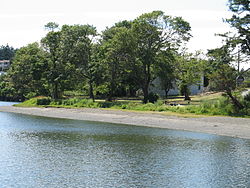Craigflower Manor
| Craigflower Manor and Schoolhouse | |
|---|---|

Craigflower Farm from a distance.
|
|
| Type | Manor; schoolhouse; agricultural community |
| Etymology | The Craigflower Farm in England |
| Location | Vancouver Island, Victoria, British Columbia, Canada |
| Founded | 1853 |
| Founder | Puget Sound Agricultural Company |
| Built | 1853–1856 |
| Architectural style(s) | Georgian Revival |
| Governing body | Parks Canada |
| Website | Craigflower Manor |
| Designated | 1975 |
The Craigflower Manor and Craigflower Schoolhouse are National Historic Sites of Canada located in View Royal, British Columbia (the Manor) and Saanich (the Schoolhouse) near Victoria. The centerpiece of each historic site is a 19th-century building — a manor and schoolhouse commissioned by the Hudson's Bay Company to provide education and lodging for their employees. Built as part of the agricultural community Craigflower Farm, the buildings served as a focal point for the community into the modern era; they remain open to the public today as museums devoted to the colonial history of Victoria.
The sites also have unique archaeological merit, encompassing three distinct periods, and types, of human habitation which span thousands of years. In addition, the existing structures have great historical and cultural value, remaining some of the best, and last, examples of their kind in Canada. These factors combine to make these two sites important National Historic Sites, and have been given government protection for the public trust.
The land in the area was formed during the last ice age in North America, approximately 13,000 years ago, when receding glaciers carved a deep gouge into the earth, which became a number of small lakes and streams. Over time, these lakes rejoined the ocean, becoming a salt-water inlet known today as the Gorge waterway, which the indigenous people call "Kosapsom". The Lekwungen, a Coast Salish tribe and ancestors of the modern Esquimalt and Songhees First Nations, settled in the area, calling the whole region "Camossung", after the legend of a girl they believed was turned to stone there.
...
Wikipedia
